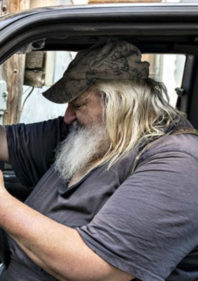
“To be homeless and poor in America is a shameful thing in some people’s eyes. That is trauma, right there.”
The American Dream lies at the heart of American culture. There’s an idea that one can ‘pull themselves up by their bootstraps’ and ‘make their dreams come true’. It’s a central component to the ideological framework of that country. One that desperately wants its people to believe that anything can happen. But is dream a reality or merely an outdated vision for a nation on the decline?
Pulitzer Prize-winning journalists, Nicholas Kristof and Sherly WuDunn wrote Tightrope: Americans Reaching for Hope and ably directed by Viva Van Loock . It’s a fascinating exploration of the American Dream and its flaws. Kristof and Dunn felt sad by the loss of too many of his childhood classmates. So they delve deeply into the root causes of many important issues. Such issues include opioid addiction, poverty and incarceration that infect American culture. There are those who are willing to help. But the key question is whether or not these small pockets of aid are enough. If they truly offer hope to the many who feel lied to by the American Dream.
Powerful and moving, Tightrope is a film that offers little judgment to those who have been broken by circumstance. The film concentrates primarily on poverty and those affected by the opioid crisis. It thus seeks to pull back the labels that culture unjustly puts upon the broken. Van Loock remind the viewer that these are not ‘drug addicts’ or ‘the poor’ but people with families. People who may not be as entirely responsible for their behavior as the ‘American Dream’ would have us believe. Tightrope has eyes of grace and empathy. It is a testament to the fact that people are more than the sum of their pain and suffering.
Interestingly, however, the questions that Tightrope asks bring few answers throughout the film. Documentaries frequently ask difficult questions about cultural issues. And usually, they are also willing to offer some form of proposal in order to help. In this way, Tightrope can feel almost overwhelming at times. It highlights those afflicted with drug addiction and the unjust poverty of American culture with few answers.

On the other hand, this lack of response also seems refreshing in a strange way. It would be nice to have clear, practical ways to respond to these issues. But Tightrope is more focused on recognizing the disconnect between ideology and reality. In doing so, the film acknowledges that these problems are monumental in size. They cannot be rectified by a simple policy change. For Tightrope, awareness becomes a form of response by opening our eyes. There are many hidden homeless people around us and racial injustice we would prefer didn’t exist does. In doing so, the film opens the door for greater compassion towards those who are suffering. It invites everyday people to involve themselves any way that they can. One way is by offering moments of grace and help to the disenfranchised.
Tightrope: Americans Reaching for Hope is willing to shine a light on the struggles of everyday Americans. Americans who remain in the shadows. It highlights the vast gap between the Dream and reality. WuDunn and Kristof recognize the struggles of the afflicted and Van Loock brings it home. They all do an excellent job of giving voice to those who have none… even if the culture at large is unwilling to hear them.

